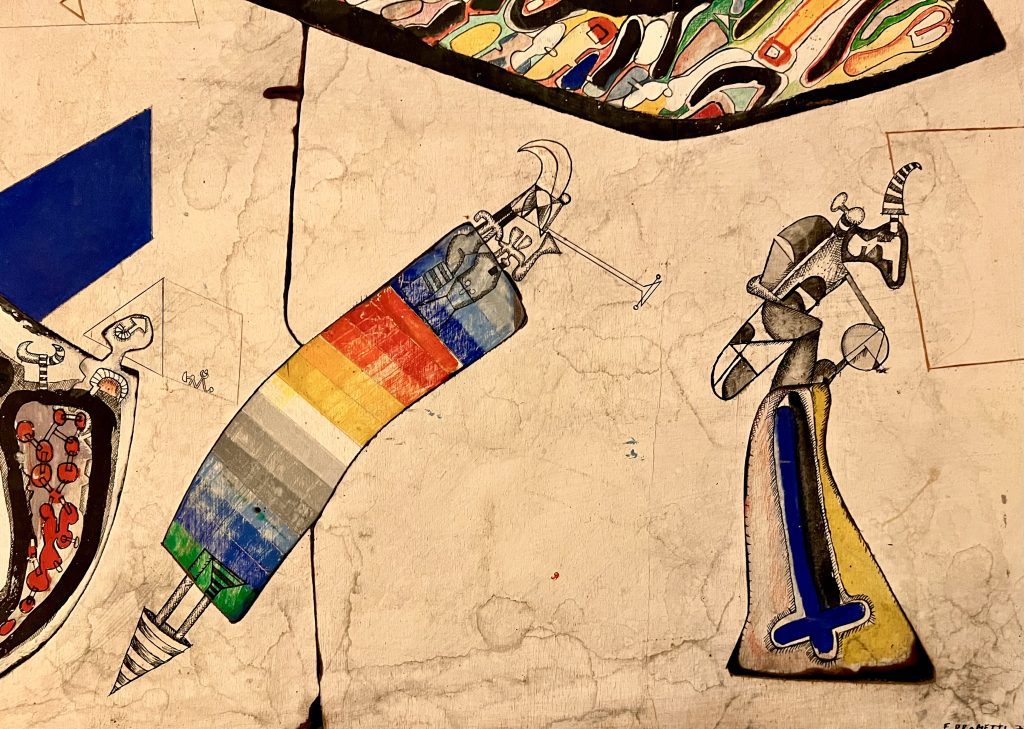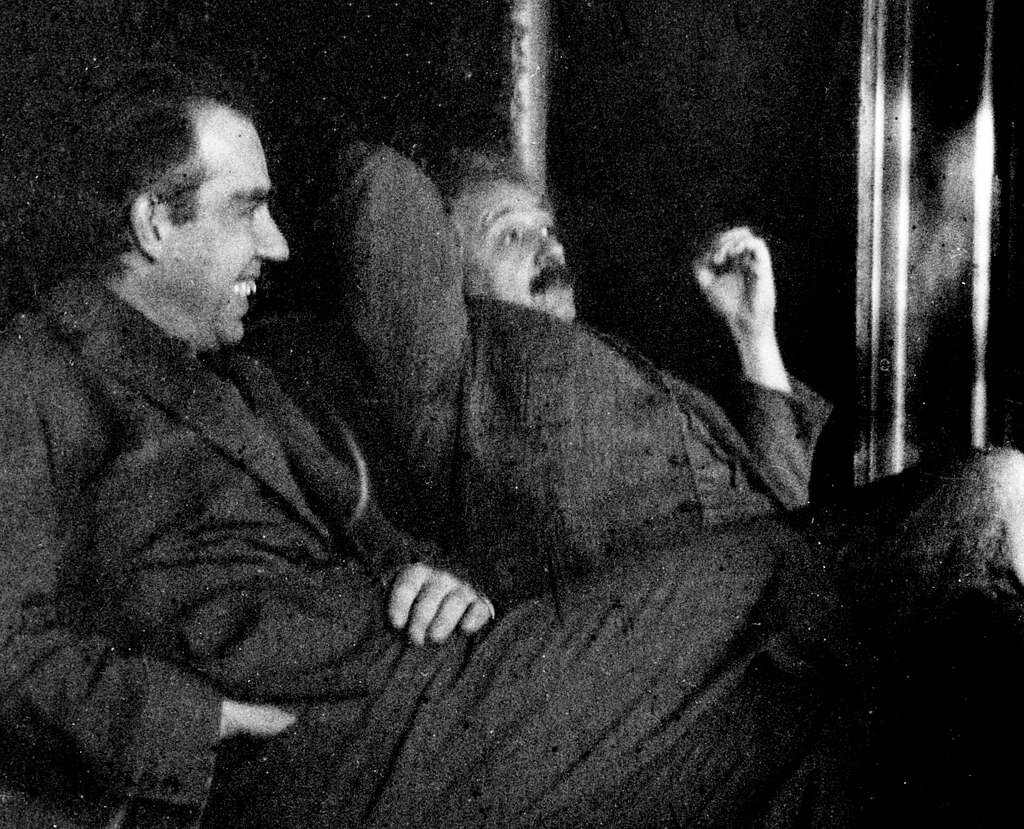What if God does Play Dice?
by Lev Tsitrin (October 2024)

As thinking social animals, we cannot help passing judgement on the people around us. Inevitably, those judgements are centered on ourselves. Is a neighbor friendly? Is a colleague receptive to feedback? Is a stranger courteous? We make a myriad judgements, consciously or not—all based on how we were treated by those with whom we came into contact.
Some of them we meet once, and will never see again. With others—family, friends, neighbors, co-workers—the contact is constant. Everyone has an opinion of everyone else—bosses, subordinates, colleagues.
And this circle includes God, too. We cannot help seeing Him as a protector and family. And based on outcomes, we pass judgement on Him—a judgement that is based on our perception of what’s fair, unconsciously assuming that what seems fair to us, is also fair in God’s eye.
In a famous instance, Abraham—greatly troubled to hear God’s decision to destroy the cities of Sodom and Gomorrah (the righteous perishing together with the sinners), exclaimed “will not the Judge of all the earth do right?” This question extrapolated Abraham’s idea of justice to God, and resulted in the first-ever debate over what we would call today the extent of permissible collateral damage: isn’t fifty innocents too much? Forty? Thirty? Ten?
One judges God according to whether one’s life’s circumstances met one’s expectations. Mark Twain suffered terrible blows—the deaths of his infant son, and of two of his daughters when they were in their twenties; correspondingly, his assessment of God was devastatingly bitter. In our days, the Holocaust has naturally become a focal point for theological discomfort. Yet oddly, the protagonist of the Book of Job—an astonishingly sophisticated discussion of innocent suffering—refuses to blame it on God (nor, just as remarkably, on himself). But Job was rather an exception.
Equally unique was Einstein’s opining on God, and his views on fairness. Those did not touch on ethics, but on the workings of the Universe. Einstein was awed by how perfectly-ordered and fine-tuned the Nature was, its current configuration predictably flowing from the immediately preceding one, based on immutable laws. Among the physicists, this view was universal—even if not felt with equally visceral intensity. But there came a reality check: a dawning realization that sometimes this predictability just wasn’t in evidence.
I am not a physicist, and my understanding of the problem is extremely limited. But, basically, the movement of particles at subatomic level turned out to be neither fully describable nor fully predictable. I will use the example that I can understand better: radioactive decay. In the elements with natural radioactivity, after a set period of time (which physicists call “half-life”), half of the nuclei would disintegrate, turning into a different element. The odd thing about this process, is that there are no predictors as to which particular nuclei would stay intact, and which wouldn’t. There is no trigger for particular nucleus’ decay. It simply happens—for no reason, without a cause.
To a traditionalist’s mind, it simply meant that the triggering mechanism has not yet been found, and was awaiting discovery. But to Einstein’s chagrin, there were some (i.e. Bohr/Heisenberg/Born, the pioneers of quantum mechanics) who maintained that our ignorance of a cause came not from a mere temporary gap in our knowledge, but was a defining feature of the subatomic world: the trigger was not discovered because there actually wasn’t any.
In other words, on subatomic level there was action without a cause. Within a certain time period, half of nuclei had to decompose—and they did. But there was no reason as to which ones did—it was just a matter of statistics, not of causes.
To Einstein, the suggestion—calmly accepted by Bohr and his school as a fact of life that there was no causality in subatomic world—smacked of universal, divine injustice against rationality. Just as when God and His two angels visited Abraham and he rebelled against Sodom’s wholesale destruction by appealing to divine justice, Einstein made the same appeal when his deeply-seated worldview came under attack, attributing to God—just as Abraham did before him—his understanding of the divinely appropriate way of doing things. “God,“ Einstein declared as a clinching argument against Bohr and his crew, “does not play dice.” Furthermore, “God is subtle, but He is not malicious.” Apparently, the suggested absence of causality would have been a sign of malice that is impossible in a just God, and therefore should be rejected, in Abrahamic fashion, right out of hand.

To Bohr, who did not think in theological terms, this was a non-argument. Yet why not take Einstein at his word and ask what kind of God would He be if He indeed “played dice”?
After all, an action without a cause is a dictionary definition of a miracle, and aren’t miracles to be expected of God? Besides, “playing dice” is in itself a cause; Einstein’s retort slips causality right into Bohr’s acausal picture, in a supernatural, under-the-radar way which is impossible to refute. Einstein’s way of processing Bohr’s rejection of causality was to surreptitiously introduce a cause.
But back to nuclear decay. As an analogy to Bohr’s acausal decomposition of nuclei, imagine causeless births. A carrot-thin woman walks down the street. Suddenly, she goes into labor, and gives birth to a child! Another thin woman just passes by her, but nothing happens. Explanation? There isn’t any; nor is there a cause: statistically, a certain percentage of women of a given age give birth, and this birth fell withing statistics.
Childbirth is by no means unusual but is entirely causal. In fact, it is a textbook example of causality that, according to Einstein, has to be a feature of the humanly—and therefore divinely—just Universe: love causes courtship, courtship causes marriage, marriage causes pregnancy, pregnancy causes childbirth. Every step in a causal chain is clearly laid out. Even the Christian miracle of Jesus’ Virgin birth was not acausal; in fact, the Church was at pains to provide a cause, finding it in the Immaculate conception. This latter was admittedly miraculous (though explainable by the need for humanity’s salvation) —but from that point on, everything was causal. To think of it, even the Immaculate conception itself had a cause in the will of God. A truly causeless birth would be much more of a miracle than a virgin birth—as is the causeless decomposition of an atom’s nucleus. It would really mean that Nature in its daily operation is, fundamentally, an on-going miracle. Hence, Einstein’s inability to even contemplate abandoning causality (and his inability to face head-on the fact that Bohr did so, which is why Einstein pretended that Bohr at least implied a cause—that of God playing dice though, in reality, Bohr denied any cause whatsoever, this one including). To Einstein, who was constitutionally unable to give up causality, Bohr’s position meant assigning to God the partial but direct day-to-day operation of the Universe (the macro-world we inhabit being still causally driven by the laws of nature). Hence Einstein’s use of theological terms, invoking God in his fulminations against quantum acausality and pointing, Abraham-style, to the divine unfairness of Bohr’s views.
In this framing of argument, Einstein does not really answer Bohr, but slyly alters Bohr’s argument by slipping in an irrefutable divine cause, thus subtly redefining Bohr’s position and making a “straw-man argument.” He then uses it for a reductio ad absurdum attack: according to Bohr, Einstein’s argument goes, God plays dice—but in reality, God does not play dice. This reveals, more than anything else, Einsteins’ view of God as at best a one-time constructor who, having set the Universe in motion, took His hands off the controls. Yet, “playing dice” makes Him—absurdly, in Einstein’s view—constantly press the buttons, the mind-boggling near-infinity of the minutest particles of which all matter is composed. The better analogy (because it would save God some effort, being more economical) would be God playing an organ—elementary particles being the keys on its keyboard, God hitting this key or that—and causing what would appear to us “acausal” quantum effects when He does so. If so, the action (or rather, the reaction) of the particles is not really a matter of statistics, or “playing dice,” but of God’s direct involvement at the most basic level of subatomic activity, of Him constantly pumping His energy into the Universe.
This is the ultimate form of God’s total engagement. Not every key gets hit at once of course—there would be no music if every key gets hit at the same time. Yet at some point, every key will get hit (since the only reason a key exists, is to be hit), though some get hit more often than others. And God shares the keyboard: we play atop of it too, in an admittedly very limited way, modifying God’s “natural” sound in making our own human one: art, and goods, and homes, and food, and—bad uses coming with good ones—weapons to hurt each other.
In this picture, God is not “impersonal” (thought I confess I do not understand what the “impersonal God” means anyways, it coming across as a contradiction in terms); the Universe is an ongoing miracle, constantly animated by a (very personal) God’s action.
This is not what Einstein expected of God, since to him, the key features of the Universe were autonomy and automaticity, the causal machinery of natural laws requiring no further external involvement — thus shutting God out of the picture completely and turning Him into a mere figure of speech. Yet the picture of God’s constant involvement is by no means illogical, though Einstein would have likely grumbled—in his aphoristic fashion—something like “God is a designer, not a workman.” After all, it offers what Einstein desired—causality (admittedly, of the immaculate conception kind, but a one that is logically impossible to refute).
Ultimately, Einstein’s sly modification of Bohr’s acausal position turned God into more than a mere figure of speech, but a real presence—the question of physics becoming a question of theology very much like the question of punishing Sodom’s criminal immorality became, for Abraham, a theological question of God’s fairness. Einstein’s struggle with Bohr’s acausality (and instinctively replacing it with a theological cause of “God playing dice”) points to a fundamental question—may be there is more to nature than just nature?
Lev Tsitrin is the founder of the Coalition Against Judicial Fraud.
Follow NER on Twitter @NERIconoclast
